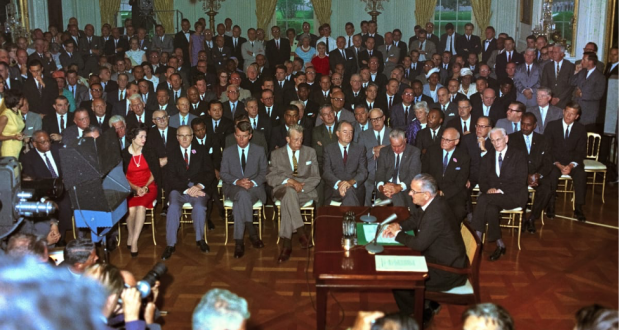Because, according to the Courts, there’s no such thing as racism. It doesn’t exist.
By Dr. G.S. Potter, Senior Editor of the b |e note
If we are talking about justice, we are talking about structural reform. If we are talking about structural reform, we are talking about policy. And if we are talking about policy, then we are talking about the Courts.
And according to the Courts, there is no such thing as racism.
You’re rubbing your eyes, but you read that correctly. The closest thing we have to racism, under the law, is discrimination. There are a number of communities that have been legally designated as a “class” of people. And race can qualify as a protected class, as can sexual orientation or disability or age. But racism does not, legally, exist. Discrimination does … and barely, at that.
Discrimination in general wasn’t outlawed until Congress passed the Fourteenth Amendment in 1868 which reads …
No state shall make or enforce any law which shall abridge the privileges or immunities of citizens of the United States; nor shall any state deprive any person of life, liberty, or property, without due process of law; nor deny to any person within its jurisdiction the equal protection of the laws.
Yet, immediately following its passage, Jim Crow was allowed to take hold and lynchings soon entered their golden era. Why?
The white supremacists in the South were given shelter for their efforts by the Supreme Court. Congress passed the Reconstruction Acts with the intent of preventing white supremacists from denying Black men and women their freedom. SCOTUS responded by gutting the Fourteenth Amendment.
In 1872, despite the fact that the first section of the Fourteenth Amendment starts with the phrase “No state shall”, the Supreme Court of the United States ruled that the privileges and immunities clause only applied to federal institutions and not the state. As Justia describes, the primary holding of the Supreme Court was …
The Privileges or Immunities Clause of the Fourteenth Amendment is limited to federal citizenship rather than extending to state citizenship.
As a result, we saw states and localities pass law after law abridging the rights and threatening the lives of Black Americans. Legally. For the next century.
In the 1950s, a Civil Rights Movement began in America and once again discrimination against Black Americans was pushed to the forefront of the nation’s politics. This time SCOTUS and Congress fell in line to end segregation through Brown v. Board of Ed (1954) and pass the Civil Rights Act (1964) and the Voting Rights Act (1965).
But as the courts grew more conservative, their determination to, once again, provide shelter for white supremacists expanded. By 1976, SCOTUS was willing to go on the offensive against freedom from discrimination. They did so by formally attacking the definition of discrimination itself.
Again, there is no such thing as racism in the United States legal system. Racism has traumatic impacts on Black communities and communities that are otherwise not White. Discrimination doesn’t. At least, in efforts to protect a white nationalist’s most powerful weapon, SCOTUS moved to legally redefine discrimination itself by eliminating the ability to use the impact of a policy as the standard to prove discrimination. They attempted to set a precedent by which discrimination only exists if it can be proven that it was intentional.
In the case of Washington v. Davis (1976), SCOTUS ruled that testing applied in the District of Colombia Police Department’s hiring process was not discriminatory even though it served to prevent Black applicants from being brought onto the force. They ruled …
Though the Due Process Clause of the Fifth Amendment contains an equal protection component prohibiting the Government from invidious discrimination, it does not follow that a law or other official act is unconstitutional solely because it has a racially disproportionate impact regardless of whether it reflects a racially discriminatory purpose.
According to the Equal Justice Society …
[B]ecause contemporary discrimination is frequently structural in nature, unconscious, and/or hidden behind pretexts (despite the fact that a tangible harm has resulted from their actions), the showing of “intent” becomes a near impossible burden for plaintiffs.There are still fields of law where the intent standard is still applied. Police misconduct and education are two examples. We can see the fruits of that standard by watching the inequalities unfold in the criminal justice system and achievement gaps. But Congress finally mustered the fortitude to push back when white nationalists were looking for SCOTUS to provide them cover in their efforts to disenfranchise Black voters.
In 1980, the Supreme Court ruled in City of Mobile v. Bolden. This case was a class action lawsuit launched on behalf of the Black citizens of Mobile. Rather that electing representatives for local districts, as is done with city councils nationwide, Mobile, Alabama deployed a system of local representation in which a three member commission was elected at large. This meant that a white majority would be able to dilute the voting power of the Black electorate. The plaintiffs argued that this practice violated the Fourteenth and Fifteenth Amendments of the Constitution, and the District court agreed.
The Supreme Court, however, did not. They ruled …
(a) Only if there is purposeful discrimination can there be a violation of the Equal Protection Clause. And this principle applies to claims of racial discrimination affecting voting just as it does to other claims of racial discrimination.
(b) Disproportionate effects alone are insufficient to establish a claim of unconstitutional racial vote dilution. Where the character of a law is readily explainable on grounds apart from race, as would nearly always be true where, as here, an entire system of local governance is brought into question, disproportionate impact alone cannot be decisive, and courts must look to other evidence to support a finding of discriminatory purpose.
In other words, the results of a policy can be clearly racist, but unless it can be proven that the policy was written and applied with the intent to discriminate against a person or community because of race it does not violate the Fourteenth Amendment. The intended effects of this ruling was to establish a precedent in which intent, not impact, was the standard by which to analyze violations of voting rights.
Congress took note and in 1982, they did their part to restore the right to vote by amending the Voting Rights Act of 1965.
The original text of the Voting Rights Act (1965) reads …
No voting qualification or prerequisite to voting, or standard, practice, or procedure shall be imposed or applied by any State or political subdivision to deny or abridge the right of any citizen of the United States to vote on account of race or color.
In response to the SCOTUS ruling in City of Mobile v. Bolton, Congress amended the passage to read …
No voting qualification or prerequisite to voting, or standard, practice, or procedure shall be imposed or applied by any State or political subdivision in a manner which results in a denial or abridgement of the right of any citizen of the United States to vote on account of race or color.
This amendment ensured that the disparate impact standard would be applied to cased involving the Voting Rights Act (1965).
SCOTUS is currently positioned to take another swing at giving the current generation of white nationalists and insurrectionists cover to deprive non-White Americans their right to vote with the case of Brvonich v Democratic National Committee, but Congress can and should be prepared to immediately pass legislation designed to formalize disparate impact as the official standard for all discrimination claims involving the right to vote.
While they are at it, they should present legislation that removes the Intent Standard from cases of discrimination in all areas of Civil Rights. Congress can and should immediately present a new Civil Rights Act that restores our Fifth and Fourteenth Amendment Protections by updating the areas in which protection is secured and installing a disparate impact standard across the board.
As a nation, we are in the throes of a new Civil Rights Movement. We need a Civil Rights Act to match it.
The Civil Rights Act of 2021 should ensure that disparate impact is not only applied to voting rights, housing rights, and employment rights. It should be expanded to also provide protection in education, health care, criminal justice, and environmental justice. It should come with sharp teeth and devastating consequences for those that violate it. And it should provide funding for lawyers for protected classes.
There is no doubt that white supremacy is aggressively attacking our communities and institutions. We need legal protections that are not only about us being equal, but provide better defense against those attacks. We need a new Civil Rights Act that closes the loophole of intent and gives us the tools to fight back against what is being done to our communities, whether a bigot admits it or not. Congress has the power to give this to us. And it’s time that we demand that from them.
 Westside Story Newspaper – Online The News of The Empire – Sharing the Quest for Excellence
Westside Story Newspaper – Online The News of The Empire – Sharing the Quest for Excellence




